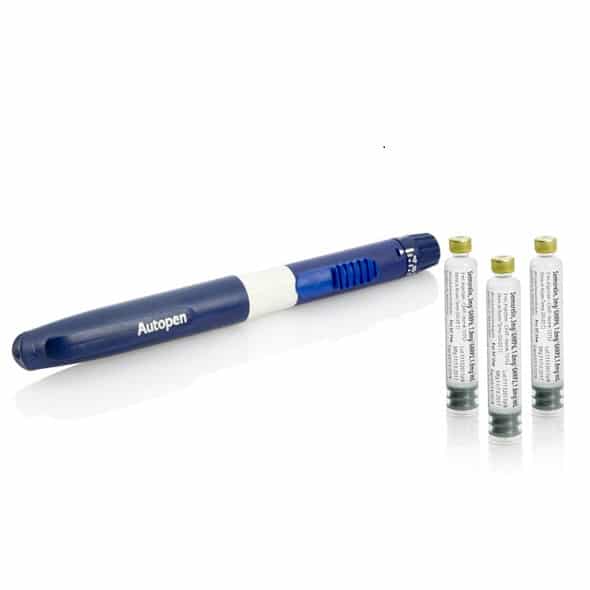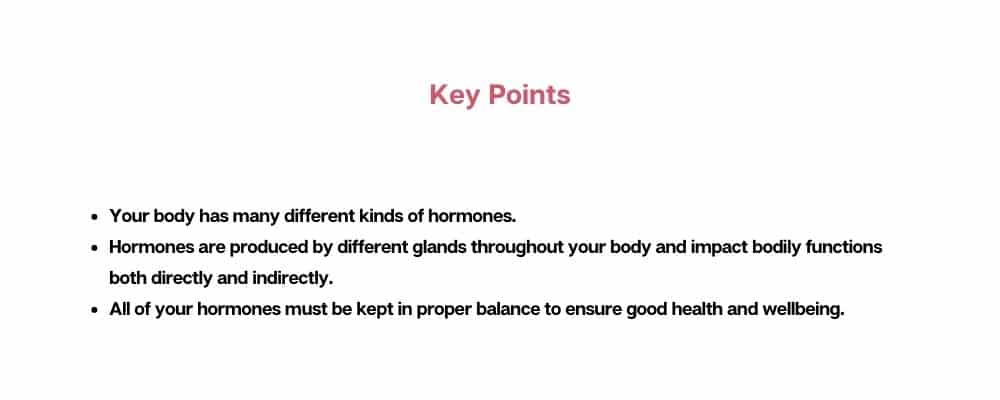
How do Hormones Work? Everything You Should Know About It
Table of Contents
Your body simply could not function without hormones.
Hormones are the messengers of your body. They send signals that are critical to almost every bodily function and overall health. Your hormones control everything from sexual function and fertility to mood and metabolism.
Hormones are chemicals produced by glands. Most hormones are produced and secreted by the glands of the endocrine system, but there are other types of glands and hormones as well.
Hormones are characterized by the glands or organs that secrete, their mechanisms of action, and the organs or bodily systems they target. Hormones must all work together in proper proportions to help maintain a condition of optimal health – a state doctors refer to as homeostasis.
A hormone imbalance occurs when there is too much or too little of a hormone. While there are certain medical conditions that occur from too much of a given hormone, a low level of hormones is by far the much more common problem. This is largely due to the fact that many critical hormones in men and women, such as the sex hormones testosterone and estrogen, and human growth hormone, or HGH, all decline as men and women age.
What Are Hormones?
Hormones are specialized molecules that serve as your body’s biological messengers. They stimulate or regulate just about every bodily function, from digestion to reproduction. There are many types of hormones produced by different kinds of glands. All of your hormones must work together in harmony for optimal health.
Hormone imbalances, as when you have too much, or too little of any given hormone, can lead to quite a number of health complications. Such specific medical conditions, such as low testosterone and growth hormone deficiency, are caused by hormone decline.
Your hormones are like the FedEx or UPS drivers of your body. But instead of delivering packages, they deliver signals all over the body, traveling through the bloodstream and interacting with organs, tissues, and cells at specific targets or receptor points. In doing so, hormones directly stimulate or otherwise regulate almost all of your body’s most important functions, including:
- Growth
- Metabolism
- Sex drive and fertility
- Digestion
- Temperature regulation
- Cardiac functions
- Mood
- Cognition
- Strength and vitality
When hormones are not present in the right amounts, it can negatively impact many aspects of your quality of life.
Hormones are very tissue and organ-specific. They work via a quite sophisticated kind of “lock and key” process where particular hormones only work upon or react with specific kinds of hormone receptors within the cells of the organ or bodily system they control.
Basically, your body uses hormones for two types of communication. One is “gland to gland” communication, such as when one gland releases a hormone that stimulates another gland to produce and release another hormone as needed. This is the case such as when the hypothalamus releases growth hormone-releasing hormone (GHRH), which in turn stimulates the pituitary gland to produce and release more HGH.
The other way hormones communicate or interact is by traveling through the bloodstream and acting directly on a target organ without another gland as an intermediary. For example, when your pancreas releases insulin, which then acts on your muscles and liver to help metabolize glucose or draw sugar from the blood.
Where are Hormones Produced?
Hormones and the organs that produce and release them make up your body’s endocrine system. The medical study of hormonal dysfunction and conditions is an endocrinology, and doctors like those at our clinics that specialize in the treatment of hormone imbalances and hormonal disorders are “endocrinologists.”
The following chart illustrates the hormones most critical to your health and wellbeing, where they are produced, and what is their primary function.
| HORMONE | WHERE ITS PRODUCED | WHAT IT DOES |
| Testosterone | Testes (testicles) | Main “male” hormone. Growth and maturity of male sexual characteristics, sex drive, and sexual performance, strength, and energy. |
| Estrogen | Ovaries | Primary “female” hormone.” Growth and maturation of female sexual characteristics important for pregnancy, and fertility, breast and uterine function, bone density, and strength |
| Progesterone | Ovaries | Critical in pregnancy and uterine function, breast function, female sexuality |
| Human Growth Hormone | Pituitary Gland | Controls and/or regulates all processes of growth from childhood to adulthood; important in protein synthesis and muscle growth; affects fat metabolism, impacts metabolism and sexual function. |
| Corticosteroid | Adrenal Glands | Regulates many bodily functions, helps fight inflammation, plays a role in blood glucose levels, blood pressure, and muscle strength, regulates salt and water balance. |
| Luteinizing hormone (LH) and follicle-stimulating hormone (FSH) | Pituitary gland | Integral to release and function of sex hormones (estrogen in women and testosterone in men) and fertility in both men and women |
| Oxytocin | Pituitary gland | Impacts feelings of “love” in men and women; in women, Stimulates contraction of the uterus and milk ducts in the breast. |
| Thyroid hormone | Thyroid gland | Along with HGH plays a role in growth and maturation, helps to regulate the nervous system metabolism, and body temperature. |
| Insulin | Pancreas | Lowers blood sugar levels; stimulates metabolism of glucose, protein, and fat. |
| Epinephrine | Adrenal glands | Increases heart rate, oxygen intake, and blood flow, particularly during “fight or flight response. |
| Norepinephrine | Adrenal glands | Maintains blood pressure |
| Growth hormone-releasing hormone (GHRH) | Hypothalamus | Stimulates growth hormone production and release by the pituitary gland. |
What Are the Types of Hormones?
As you can see from the chart above, your body produces many different hormones. In turn, these various hormones reflect different types of hormones based on their chemical compositions and mechanisms of action.
We know that your body produces more than 50 different hormones.
As many as there are and their varied functions, there are basically three different types of hormones.
- Lipid-Derived Hormones (or Lipid-soluble Hormones)
- Amino Acid-Derived Hormones
- Peptide Hormones

Lipid-Derived Hormones (or Lipid-soluble Hormones)
Most lipid hormones are derived from cholesterol and thus are chemically similar to it. These are also known as “steroid hormones.” The primary examples of lipid-derived hormones are the sex hormones testosterone and estrogen. Cortisol is another steroid hormone that is released by the adrenal glands. All steroid hormones are known as “fat-soluble,” which means they are water-insoluble. They are transported by proteins in the blood, and, being fat soluble, can cross the cell membranes directly into the targeted cells.
Amino Acid-Derived Hormones
As the name implies, amino acid-derived hormones are derived from amino acids, specifically, tyrosine and tryptophan. But unlike peptide hormones, which also are made up of multiple amino acids, amino-acid-derived hormones are small molecules. The two amino acid-derived hormones listed on the chart above are epinephrine and norepinephrine, which are among the adrenal hormones. Thyroid hormones made and released by the thyroid gland are also amino acid-derived hormones.
Peptide Hormones
Peptide hormones, such as human growth hormone, are long-chain molecules made up of amino acids in specific sequences. This class of hormones also includes oxytocin, IGF-1, Growth hormone-releasing hormone (GHRH), and insulin.
Amino acid-derived and polypeptide hormones are water-soluble as opposed to fat-soluble. Only fat-soluble hormones can cross the cell membrane into the cell. Water-soluble hormones cannot cross the membrane and, therefore, must interact with specialized receptors that are located on the outer surfaces of their biological targets.
Conclusion
Hormones are critical to the way your body functions and to maintaining your good health. Hormone imbalances which can commonly be caused by age-related hormone decline, can lead to several health issues. Some of the most common hormone-related conditions include the following.
- Diabetes and other metabolic conditions
- Thyroid disease
- Irregular menstruation
- Menopause
- Female infertility
- Male infertility
- Low testosterone
- Growth hormone deficiency
- Obesity
There are certain actions you can take, such as eating a healthy diet, getting enough sunshine, and remaining active, that can help keep your hormones in balance. If you are suffering from age-related hormone decline, hormone replacement therapy for men or women could help to give you back what time and nature take away.


